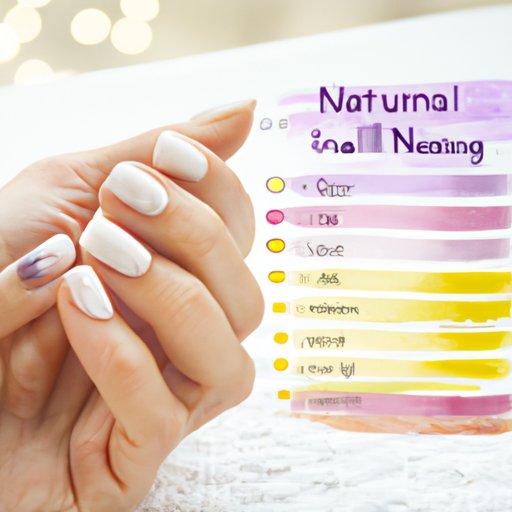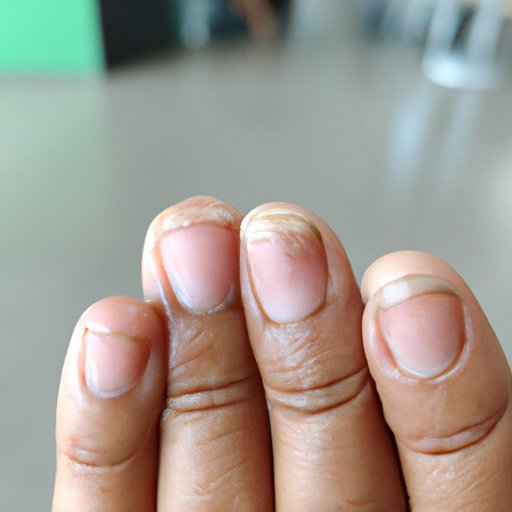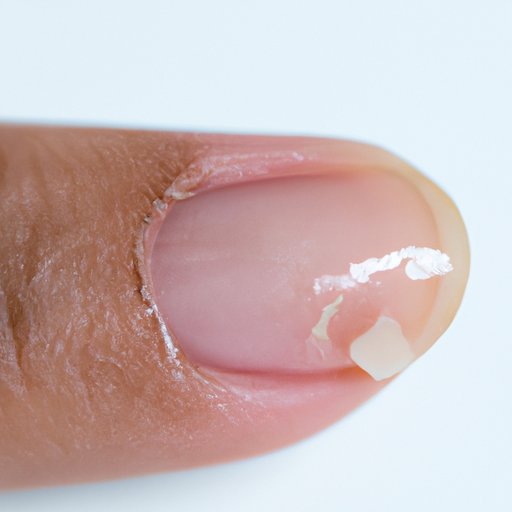Introduction
Your fingernails can tell you a lot about your health. From the color of your nails to the shape of them, there are many indicators that can provide insight into the health of your body. In this article, we’ll explore what your fingernail color, shape, cuticles, and stress levels can reveal about your health.
What Your Fingernail Color Can Tell You About Your Health
The color of your nails can be an important indicator of your overall health. Certain colors can be signs of nutritional deficiencies or other health issues. Some common nail colors and their implications for your health include:
- White nails – White nails can be an indication of anemia, liver disease, or kidney disease.
- Yellow nails – Yellow nails can be an indication of diabetes, respiratory problems, or thyroid disease.
- Blue nails – Blue nails can be an indication of a lack of oxygen in the body, which can be caused by lung disease or heart disease.
- Brown nails – Brown nails can be an indication of liver disease, kidney disease, or fungal infection.

Identifying Nutritional Deficiencies Through Your Fingernails
Nutritional deficiencies can also be identified through changes in your nails. If your nails are brittle, thin, or easily broken, this can be a sign of a lack of certain vitamins and minerals in your diet. Vitamin A, B-complex, C, D, and E as well as iron, calcium, and zinc are all essential for healthy nails.
How to Recognize Deficiencies
If you notice any of the following signs in your nails, it could indicate a nutritional deficiency:
- Brittle nails
- Thin nails
- Ridges in the nails
- White spots on the nails
- Slow growth
- Easily splitting or breaking nails
Foods That Help Combat Deficiencies
If you suspect a nutritional deficiency, there are several foods that can help combat the issue. Foods high in Vitamin A such as sweet potatoes, spinach, and carrots can help strengthen nails. Foods high in B-complex vitamins such as whole grains, legumes, and nuts can also help. Additionally, foods high in calcium, such as dairy products, can help fortify nails. Eating a balanced diet can also help ensure that your body is getting all of the essential nutrients it needs for healthy nails.

Examining the Shape of Your Nails
The shape of your nails can also provide clues about your health. If the edges of your nails are curved inward, this can be a sign of iron deficiency. If the edges of your nails are curved outward, this can be a sign of thyroid problems or a reaction to medication.
How the Shape of Your Nails Can Reveal Health Issues
In addition to the shape of your nails, the thickness of your nails can also be an indicator of health issues. If your nails are too thick, this can be a sign of psoriasis or inflammatory arthritis. If your nails are too thin, this can be a sign of anemia, liver disease, or kidney disease.
Tips for Maintaining Healthy Nail Shapes
To maintain healthy nail shapes, make sure to keep your nails clean and dry. Avoid biting your nails or using harsh chemicals on them. You should also wear gloves when doing activities that involve water or cleaning chemicals. Additionally, make sure to get regular manicures and pedicures to keep your nails looking their best.
Examining Your Cuticles
Your cuticles can also provide clues about your health. Cuticles can become dry and cracked if they are not properly cared for, and this can be an indication of dehydration or a lack of vitamins and minerals in your diet.
What Do Cuticles Reveal About Your Health?
Dry and cracked cuticles can also be a sign of an underlying health condition, such as diabetes or thyroid disease. Additionally, if your cuticles are inflamed or red, this can be an indication of an infection or a reaction to medication.
Caring for Your Cuticles
To keep your cuticles healthy, make sure to moisturize them regularly with a cuticle cream or oil. You should also avoid picking at them and trim them regularly. Additionally, make sure to visit your doctor if you notice any redness or inflammation in your cuticles.

Signs of Stress in Your Fingernails
Stress can also affect your nails, causing them to become brittle and easily breakable. Other signs of stress in your nails include ridges, white spots, and slow growth.
Recognizing the Signs of Stress
If you notice any of these signs in your nails, it’s important to take steps to reduce your stress levels. Stress can have a negative impact on your overall health, so it’s important to take care of yourself and manage your stress levels.
Ways to Manage Stress Levels
There are many ways to manage stress levels, including: getting enough sleep, eating a healthy diet, exercising regularly, meditating, and spending time with friends and family. Additionally, it can be helpful to talk to a therapist or counselor if you’re feeling overwhelmed or having difficulty managing your stress.
Understanding the Connection Between Skin Conditions and Nail Health
Certain skin conditions can also affect the health of your nails. Psoriasis, eczema, and fungal infections can all cause discoloration and brittleness in your nails.
Common Skin Conditions Affecting Nail Health
Psoriasis is a common skin condition that can affect the nails, causing them to become yellow, brittle, and easily breakable. Eczema can cause redness and inflammation in the nails, and fungal infections can cause white spots and discoloration. It’s important to see a doctor if you notice any of these signs in your nails.
Treatment Options for Skin Conditions Affecting Nail Health
Treatment options for skin conditions affecting nail health vary depending on the condition. For psoriasis, topical medications and light therapy can be used to treat the condition. For eczema, topical medications and lifestyle modifications can help. For fungal infections, antifungal creams and oral medications can be used.
Conclusion
Your fingernails can tell you a lot about your health. Changes in color, shape, cuticles, and stress levels can all be indications of underlying health issues. By paying attention to your fingernails, you can identify potential health problems and take steps to address them. Eating a balanced diet, taking care of your cuticles, and managing your stress levels can all help maintain healthy nails.
Summary of What Fingernails Say About Your Health
Fingernails can provide insight into your overall health. Changes in color, shape, cuticles, and stress levels can all be indicators of underlying health issues. Eating a balanced diet, taking care of your cuticles, and managing your stress levels can all help maintain healthy nails.
Final Thoughts on Maintaining Healthy Nails
By paying attention to your fingernails, you can gain valuable insight into your health. Taking care of your nails and recognizing any changes can help you identify potential health problems and take steps to address them. With proper care, you can keep your nails healthy and strong.
(Note: Is this article not meeting your expectations? Do you have knowledge or insights to share? Unlock new opportunities and expand your reach by joining our authors team. Click Registration to join us and share your expertise with our readers.)
